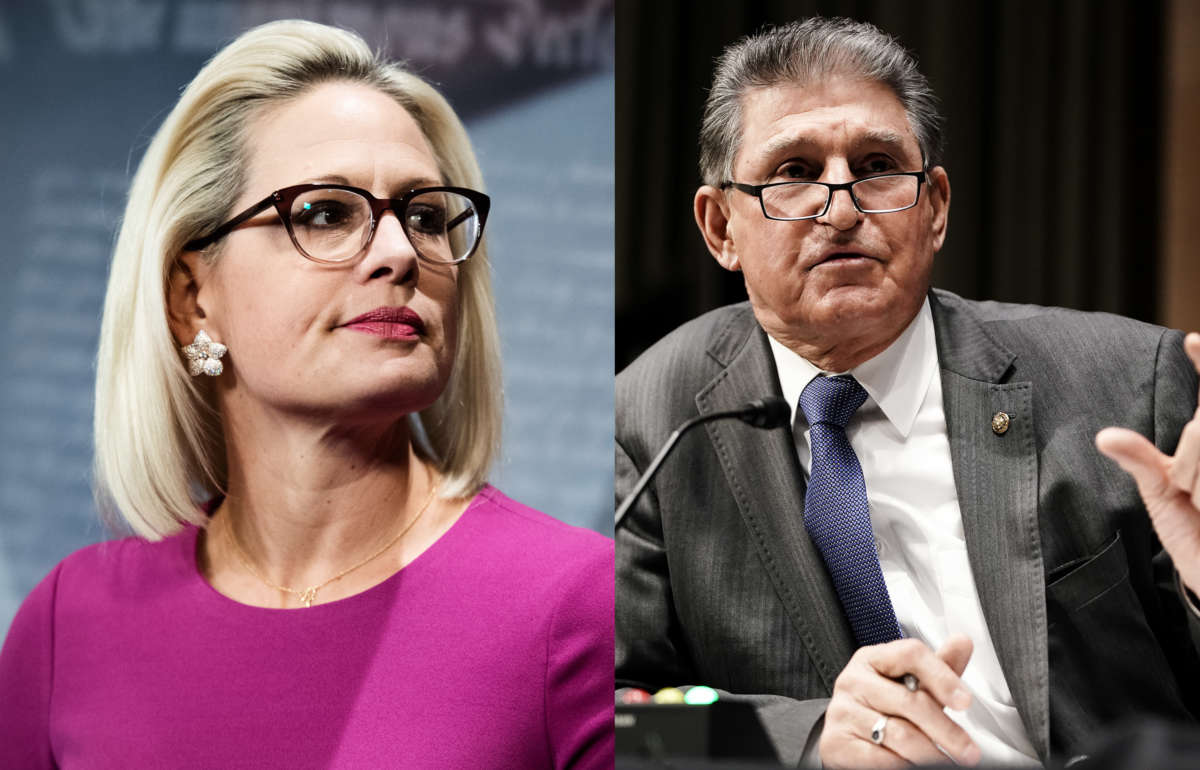Truthout is an indispensable resource for activists, movement leaders and workers everywhere. Please make this work possible with a quick donation.
Since the new Senate convened for the first time last week, its new leaders, Majority Leader Chuck Schumer and Minority Leader Mitch McConnell were stuck on a stalemate over the Senate filibuster — McConnell was dead set on keeping it, while Schumer, with his newly found majority and power, would not cave on his demand to keep the filibuster.
On Monday night, that stalemate ended.
Schumer called it a win: “We’re glad Senator McConnell threw in the towel and gave up on his ridiculous demand,” said one Schumer spokesperson, “We look forward to organizing the Senate under Democratic control and start getting big, bold things done for the American people.”
But at the end of the day, McConnell ended up getting what he wanted. Though he didn’t get any promises from Schumer about keeping the filibuster, Joe Manchin (D-West Virginia) and Kyrsten Sinema (D-Arizona), two moderate Democrats, have come out strongly against getting rid of it, effectively securing McConnell’s demand to keep the filibuster. Democrats hold the majority, so they could have used the “nuclear” option to abolish the filibuster, but they needed all 50 Senators to stand together on it.
So, on Monday, McConnell declared victory for his side. “Today two Democratic Senators publicly confirmed they will not vote to end the legislative filibuster,” he said in a statement. With the protection of the filibuster, Schumer and McConnell will share power in the same way that the two parties did the last time the Senate was split down the middle in the 2000s. “The legislative filibuster was a key part of the foundation beneath the Senate’s last 50-50 power-sharing agreement in 2001. With these assurances, I look forward to moving ahead with a power-sharing agreement modeled on that precedent,” McConnell said.
Get our free emails
The protection of the filibuster is a major win for Republicans, and will likely be a major roadblock for Democrats hoping to pass any progressive legislation with their newfound majority. The legislative filibuster will require most bills to get 60 votes to pass. Under Barack Obama, McConnell broke records with his use of the filibuster, blocking 79 of Obama’s nominees from 2009 to 2013, which led the Democrats to change nominations to a simple majority vote.
As many have pointed out, McConnell’s use of the filibuster is highly partisan. In 2017, McConnell ended the use of the legislative filibuster specifically to push through Donald Trump’s Supreme Court nominees after refusing to hold hearings on Merrick Garland, Obama’s nominee, for almost a year.
“Step by step,” wrote former labor secretary Robert Reich in The American Prospect, “McConnell has sacrificed the Senate as an institution to partisan political victories.” In 2005, McConnell was a key player in the Republican effort to end the filibuster at a time when they had a 55-seat majority. He once even filibustered his own bill in 2012, which pundits at the time argued was a great case for filibuster reform.
Now that Democrats are in charge by a narrow margin, McConnell is insistent on keeping the filibuster intact. And this week-long showdown over the filibuster is likely indicative of McConnell’s intentions to use it.
While this is not entirely surprising coming from McConnell, many on the left were hoping for transformative legislation to be passed under Biden and expressed frustration that Manchin and Sinema would take McConnell’s side on the filibuster.
Reich noted on Twitter that, if Democrats aren’t efficient in passing legislation in the coming years, it will harm the Democratic party. “Memo to Kyrsten Sinema and Joe Manchin: Supporting the filibuster will backfire. Keep it in place and risk losing your seats in 2024,” he said.
Many left and progressive groups have been advocating for an elimination of the filibuster even before Democrats clinched the majority in this election. Such anti-filibuster voices include the AFL-CIO, the NAACP, gun control groups and the Sunrise movement, reports The New Republic. Many activists say that abolishing the filibuster will be the only way to pass progressive policy.
With the filibuster firmly in place for now, Democrats will have to resort to budget reconciliation to pass legislation with a simple majority, as Budget Committee Chairman Bernie Sanders discussed this week with regards to passing a new COVID relief bill. Democrats in 2010 used budget reconciliation to pass the Affordable Care Act. Sans filibuster reform, it will likely be the only hope for ambitious agenda items like addressing the climate crisis.
A terrifying moment. We appeal for your support.
In the last weeks, we have witnessed an authoritarian assault on communities in Minnesota and across the nation.
The need for truthful, grassroots reporting is urgent at this cataclysmic historical moment. Yet, Trump-aligned billionaires and other allies have taken over many legacy media outlets — the culmination of a decades-long campaign to place control of the narrative into the hands of the political right.
We refuse to let Trump’s blatant propaganda machine go unchecked. Untethered to corporate ownership or advertisers, Truthout remains fearless in our reporting and our determination to use journalism as a tool for justice.
But we need your help just to fund our basic expenses. Over 80 percent of Truthout’s funding comes from small individual donations from our community of readers, and over a third of our total budget is supported by recurring monthly donors.
Truthout has launched a fundraiser, and we have a goal to add 231 new monthly donors in the next 48 hours. Whether you can make a small monthly donation or a larger one-time gift, Truthout only works with your support.
